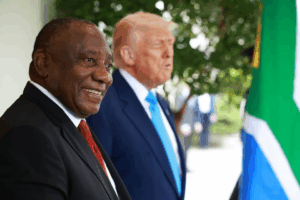
Photo source: Alamy
There must be consequences for people who encourage criminal activity on social media, but more than anything, we need to address the needs of the poor, writes Dr Imraan Buccus.
The arrests of people accused of “instigating” the riots of July 2021 are a step forwards in some ways, but a step backwards in other ways. Three important points need to be made.
The first has already been made by Justice Malala, who noted that the Radical Economic Transformation (RET) Twitter mob has reacted to the arrests with their now very tiresome whataboutery, this time trying to stir up anti-Indian feeling. Once again Pravin Gordhan is being referred to as “Jamnadas” and the seemingly immortal colonial stereotype of the cunning Indian controlling African people is being trotted out.
No democracy can accept a situation in which people openly call for burning and destruction.
A second point is that, although it is good that there is finally some sort of challenge to the impunity that the RET faction has enjoyed, with all kinds of antisocial and sometimes criminal acts, the fact that Dudu Zuma-Sambudla has not been arrested seems to indicate that the powerful still enjoy impunity.
The third point is more complex, and relates to a failure of much media reporting. Riots are by definition spontaneous mass phenomena. They are often triggered by an event – such as the police killing of a young black man in the US – but they are not triggered by incitement. If riots could be triggered simply by inciting people on social media, every extremist group in the world would be inciting riots every second week.
When the media speak as if the thousands of people who took to the streets were all there because “instigators” had “incited” them, they treat these people like dupes, like sheep. We now know beyond any doubt that the riots had three main components.
There were the masses who began looting food. There were the Zuma supporters, few in number, who actively sought to destroy infrastructure in an organised way. And there were the opportunists and criminals who stepped into the chaos to take what they could for themselves.
To speak as if all these people were on the streets because of social media instigation is not only inaccurate; it also vastly overstates the power of the Zuma faction in general, and its online component in particular.
But it also erases the material causes of the riots, which lay in the desperation caused by the Covid-19 lockdowns, and then the withdrawal of the Covid grant. One well-known editor recently wrote that the riots were nothing more than “common criminality”. This is extremely unfortunate, since it criminalises thousands of ordinary people and removes attention from the social circumstances that led to the riots.
The riots were hugely destructive in many ways, including in personal, social and economic terms. It is essential that we do all in our power to avoid a second round of rioting. This means the Zuma faction should no longer enjoy impunity for criminal acts. It also means that there needs to be consequences for people who encourage criminal activity on social media. But more than anything, we need to address the material needs of the poor.
The best insurance against another riot is social solidarity. Many community-based organisations did sterling work after the riots but it is only the state that can make systemic change. As a first step we need to implement a basic income grant. This won’t resolve all our problems but it will be a significant move towards a more inclusive society.
When we talk about people who took food in the riots as “common criminals” and speak as if a few hotheads on Twitter “instigated” a mass phenomenon, we miss what is most important about last July – that thousands of people were going hungry, and that the Zuma faction was able to exploit this.


